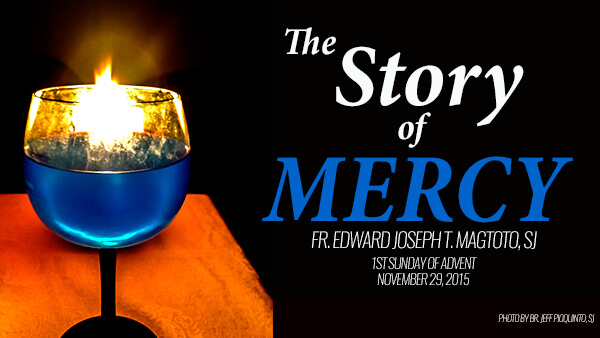


Fr. Edward Joseph T. Magtoto, SJ
1st Sunday of Advent
November 29, 2015
I recently learned from the thanksgiving speech of a newly-ordained Jesuit that the Japanese have a unique engagement tradition. The man begins by asking the girl’s hand in marriage, to which she replies,
こんな私でもよかったら
which roughly translates to, “If it would delight you to bear with my faults.”
Although that may not sound particularly romantic, in a way, such a statement is able to capture imperfection in relationships. It is a humble expression, but it is also a very real expression as it accepts that in a relationship there will be good and there will be bad, and that one cannot always live out what is expected of him or her.
Marriage had not always been romantic—there was a time when arranged marriages were much more common. Now, marriage out of romance is the norm. Hence, the ideal is projected towards the partner. Esther Perel, a Belgian relationship expert, when speaking on infidelity mentions,
“When marriage was an economic enterprise, infidelity threatened our economic security. But now that marriage is a romantic arrangement, infidelity threatens our emotional security. We have a romantic ideal in which we turn to one person to fulfill an endless list of needs: to be my greatest lover…my emotional companion, my intellectual equal. And I am…chosen…I’m irreplaceable, I’m the one. And infidelity tells me I’m not. It is the ultimate betrayal. Infidelity shatters the grand ambition of love… [and] threatens our sense of self.”
In other words, in a marriage that revolves only around romantic ideals, any form of infidelity would leave a gaping wound that will not likely be healed.
In today’s passage, the prophet Jeremiah contrasts Zedekiah’s unfaithfulness with God’s faithfulness. Zedekiah employed strategy—aligning himself with those in power—to protect Israel, and in so doing made Israel lose her sense of self. The focus of the passage, though, is not Zedekiah’s and thus Israel’s infidelity, but God’s fidelity. Here we have an image of a God who despite experiencing Israel’s transgressions continues to be faithful.
God’s mercy does not mean that He is encouraging Israel to be unfaithful. Rather, having experienced such acceptance and love allows Israel to face her weaknesses and have a healthier sense of self. God’s fidelity encourages Israel to be faithful.
With that image of God, today’s Gospel is indeed good news. Instead of fostering fear and anxiety, upon hearing Jesus’ apocalyptic words, we can as Luke writes, “raise our heads” with confidence in God’s mercy.
The season of advent is a sign of that confidence in God’s mercy. Mercy is the reason why God became man. The story of mercy continues even with Jesus on the cross. Walter Cardinal Kasper writes, “To believe in the crucified son is to believe that love is present in the world and that it is more powerful than hate and violence, more powerful than all the evil in which human beings are entangled.” Advent is an acknowledgment of the fidelity of a God who does not speak of vengeance but continues to have a heart open to love.
In preparation for Christmas, as we look back and recall our own transgressions, may we be grateful for the blessings we have received despite our infidelity. May the gratitude we have enable us to “make more and more progress in the kind of life [we] are meant to live.”